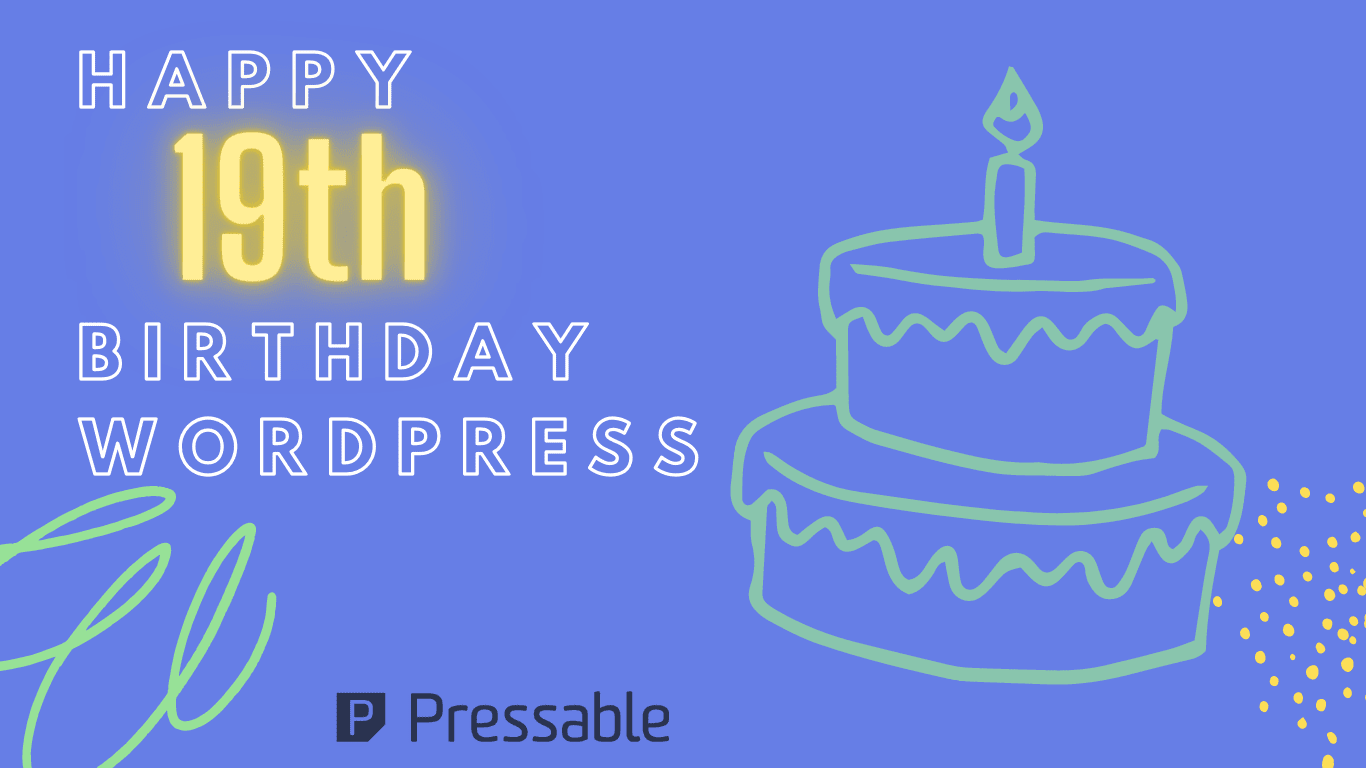Raise a glass as we toast 19 years of WordPress.
The world’s most used content management system celebrates 19 years of powering everything from blogs to eCommerce stores. To celebrate, we’re looking at the top reasons we love WordPress and the most significant developments from the platform in the last 19 years.
If you’re new to WordPress, we hope this post illustrates why the platform is beloved by technical novices and experienced developers alike. WordPress powers more than 40% of websites around the world. Keep reading to see why you should use WordPress.
Why We Love WordPress
If WordPress threw a party and invited everyone it knew, the biggest gift probably would be from us. The card attached would say: WordPress, we love you because of…
Open Sourcing
WordPress is an open-source platform, free for anyone to use. WordPress helps build a better internet by making its platform available to the masses. Also, open-source platforms encourage more collaboration and development. WordPress would not enjoy the same popularity, large community, and extensive selection of plugins and themes if it wasn’t open source.
Infinite Possibilities
You can build anything in WordPress. The platform is versatile enough to handle everything from your personal blog to enterprise eCommerce. You can also customize WordPress exactly the way you want. The open-source solution enables you to modify any aspect of your site. There are also probably at least half a dozen plugins available for any customization you want to make.
Safety and Security
When paired with the right hosting services, WordPress is an incredibly powerful, smart, and safe platform. WordPress offers excellent SEO and security features. Again, the platform’s flexibility shines here as you can customize your site for optimal search performance or introduce any additional security measures you need.
Continual Improvements
WordPress is constantly evolving. We’re blown away by some of the new features in WordPress 6.0. WordPress has changed considerably from its humble beginnings as a blogging platform. It grew into a robust content management system after recognizing most users build way more than blogs with the tool.
The Incredible Community
The thing we love most about WordPress is the user community. WordPress users are some of the most innovative, creative, and helpful people. The community works together to build amazing tools and continuously test the platform’s latest versions to ensure we can all keep building better websites.
The First 19 Years of WordPress
So, what makes WordPress the system we know and love today? Let’s look back at some of the platform’s biggest milestones.
First Public Version Released
The first public version of WordPress debuted on May 27, 2003. WordPress launched to replace the blogging software b2/cafelog. The main developers for b2/cafelog decided to discontinue the platform, so users Matt Mullenweg and Mike Little built a new platform.
Plugin Architecture Added
A year later, Version 1.2 of WordPress introduced the plugin architecture, unlocking the ability to extend WordPress functionality in new ways. Users wrote their own plugins and shared them. This collaboration planted the seeds for the growth of WordPress’ vibrant user community.
Themes and Pages Introduced
In February 2005, Version 1.5 added new features, including a new theme system, comment moderation tools, and pages. Themes and pages allowed the system to handle more than blogs.
WordPress Foundation Started
WordPress Co-Founder Matt Mullenweg’s company Automattic owned the trademark and logo rights for WordPress. In June 2010, the company transferred the rights to a new non-profit organization, the WordPress Foundation. The foundation’s mission is to ensure perpetual free access to WordPress.
Transition to More than Blogging
With the release of WordPress 3.0 in 2010, the platform started taking steps to transition to a full-fledged content management system. Version 3.0 added customization options for post types, taxonomies, headers, menus, and backgrounds. During this time, WordPress also added several eCommerce plugins to the repository.
New Editing Experience
The 2018 launch of WordPress 6.0 changed the WordPress editing experience drastically with the introduction of the Gutenberg editor. This new block editor made it easier to create posts with different content types. Enhancements to the blocks and block editor remained the focus of WordPress for the next several releases.
Full-Site Editing and the Future of WordPress
In 2021 and 2022, WordPress releases focused on full-site editing features such as templates and site-wide blocks. WordPress 6.0 expands the full-site editing capabilities in new ways. Be sure to check out our guide to what’s new in 6.0 and our overview on what to expect from full-site editing.
Celebrating 19 Years of WordPress
How will you celebrate 19 years of WordPress? You’ll probably see the hashtag #wp19day. Share your WordPress story and best work using the hashtag. You can also share your WordPress story on the official anniversary website at wp19.day.
One of the best ways to celebrate your love of WordPress is to build something new and amazing. Whatever you’re building, Pressable is here to help. Check out our managed WordPress hosting plans to find one that works for you. Pressable offers 24/7 support. Our hosting is 100% scalable, optimized for speed, and offers enhanced security and peace of mind. Try Pressable for free today.
Zach Wiesman
Zach brings a wealth of knowledge to Pressable with more than 12 years of experience in the WordPress world. His journey in WordPress began with creating and maintaining client websites, fostering a deep understanding of the intricacies and challenges of WordPress. Later, his knack for problem-solving and commitment to service led him to pursue a role at Automattic, where he excelled in providing customer support for WooCommerce. His expertise extends beyond technical proficiency to encompass a deep understanding of the WordPress community and its needs. Outside of work, Zach enjoys spending time with his family, playing and watching sports, and working on projects around the house.








